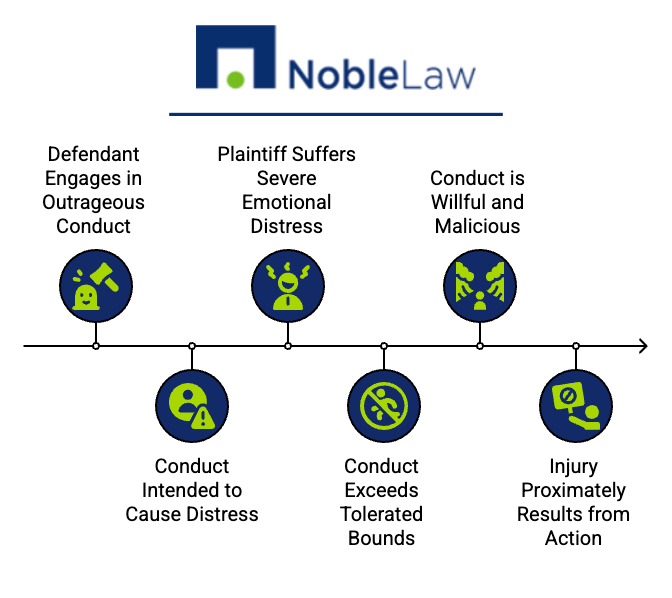Understanding the Limitations of Negligent Infliction of Emotional Distress in North Carolina
North Carolina recognizes torts for both negligent and intentional infliction of emotional distress. However, North Carolina courts have instructed that North Carolina law does not permit an action for negligent infliction of emotional distress by an employee against an employer because the Workers’ Compensation Act preempts all claims for negligent injury by employees against employers.
What is Intentional Infliction of Emotional Distress (IIED)?
Intentional infliction of emotional distress (“IIED”), however, is in a class of torts called intentional torts. This means that a plaintiff must prove that the defendant intended to injure the plaintiff and that the plaintiff was indeed injured as a result.
Legal Requirements to Prove an IIED Claim
North Carolina courts have stated that a Plaintiff claiming intentional infliction of emotional distress must prove that:
- (1) the defendant engaged in extreme and outrageous conduct;
- (2) the conduct was intended to cause severe emotional distress to the plaintiff; and
- (3) the defendant’s conduct in fact caused severe emotional distress.
The defendant’s conduct must have exceeded all bounds usually tolerated by decent society and caused mental distress of a very serious kind. Conduct that is willful, malicious, calculated, deliberate and purposeful will often be found to be intentional in nature. North Carolina courts do not require foreseeability of damages as an element of the tort. Because the action giving rise to the tort was intended to cause injury, any injury proximately resulting from the wrongful action would suffice for the plaintiff to prove that she suffered damages.
The law in North Carolina indeed sets a high bar for a plaintiff to succeed on an IIED claim. While difficult, it is not impossible for North Carolina employees to prove that their employer intended to cause their emotional distress. However, the plaintiff would need to show that the employer’s conduct was so egregious as to be considered out of bounds by any reasonable person. Offensive comments alone, without some other aggravating factor, usually will not suffice to show “extreme and outrageous conduct.”
Truly hostile work environments may sometimes give rise to a claim of intentional infliction of emotional distress against the employer, if the employee can prove that her supervisor intended the harm. An employer will be vicariously liable for the intentional torts of its employees. Intent can be inferred from conduct that is so outside of societal norms that a reasonable person would find it to be emotionally damaging.
The Role of Sexual Harassment and Discrimination in IIED Cases
Sexual harassment is one of the most common underlying reasons employees sue for IIED. Racial hostility and harassment on the basis of other protected categories such as disability, religion, color, national origin, or age also routinely form the basis for IIED claims.
However, IIED claims do not necessarily have to stem from violation of a specific employment law or statute. They may arise simply because an employer or its agent acted in an obscene manner or threatened an employee with physical harm.
When to Consult an Employment Attorney for IIED Claims
If you believe you have been the victim of outrageous offensive conduct that has caused you severe emotional distress, you should consult immediately with a skilled employment attorney.
About The Noble Law Firm
The Noble Law is a women-owned employment law firm with offices in North Carolina and South Carolina, founded by Laura Noble in 2009. Specializing in wrongful termination, workplace harassment, workplace retaliation, workplace mediation, and neutral third-party investigations, the firm is committed to leveling the playing field for employees. Their focus is on delivering positive outcomes with empathy and integrity, while also driving societal change in employment law.
The firm emphasizes diversity, collaboration, and innovation, fostering a balanced work environment that values the personal lives of its staff. With a strong commitment to technology and efficiency, The Noble Law provides personalized attention to a select group of clients, handling cases involving harassment, discrimination, retaliation, and more. The team’s extensive litigation experience allows them to deliver thorough and assertive representation.


